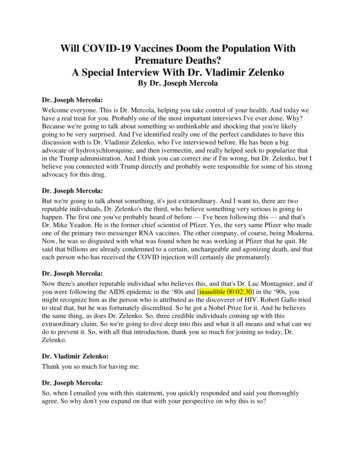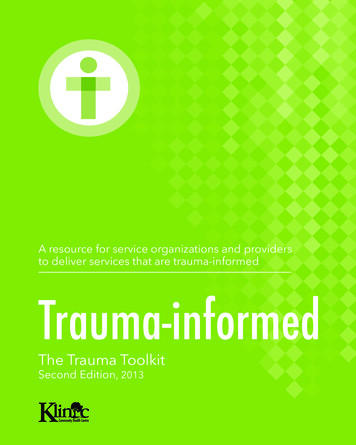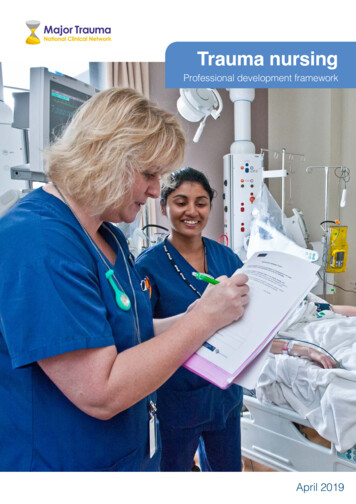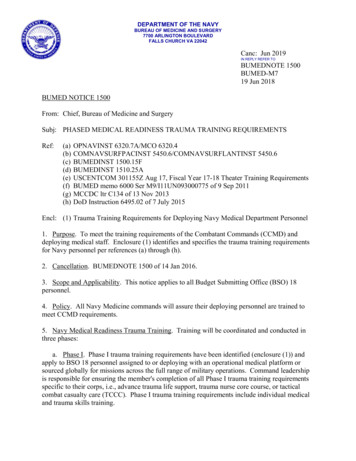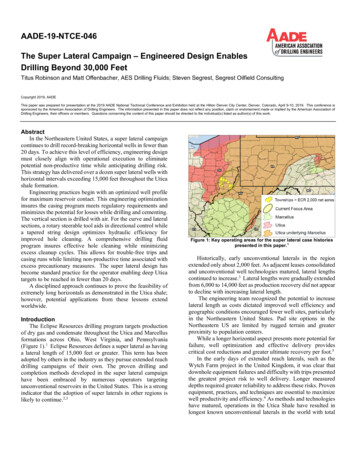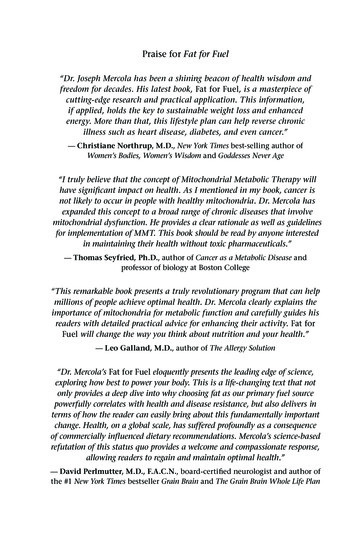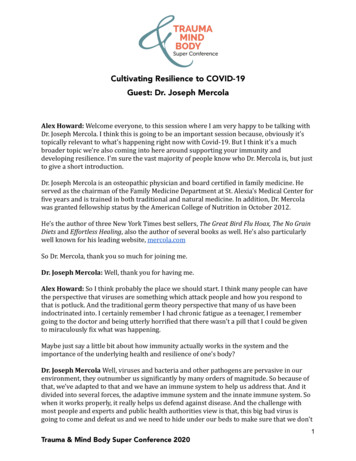
Transcription
Cultivating Resilience to COVID-19Guest: Dr. Joseph MercolaAlex Howard: Welcome everyone, to this session where I am very happy to be talking withDr. Joseph Mercola. I think this is going to be an important session because, obviously it'stopically relevant to what's happening right now with Covid-19. But I think it's a muchbroader topic we're also coming into here around supporting your immunity anddeveloping resilience. I'm sure the vast majority of people know who Dr. Mercola is, but justto give a short introduction.Dr. Joseph Mercola is an osteopathic physician and board certiFied in family medicine. Heserved as the chairman of the Family Medicine Department at St. Alexia's Medical Center forFive years and is trained in both traditional and natural medicine. In addition, Dr. Mercolawas granted fellowship status by the American College of Nutrition in October 2012.He's the author of three New York Times best sellers, The Great Bird Flu Hoax, The No GrainDiets and Effortless Healing, also the author of several books as well. He's also particularlywell known for his leading website, mercola.comSo Dr. Mercola, thank you so much for joining me.Dr. Joseph Mercola: Well, thank you for having me.Alex Howard: So I think probably the place we should start. I think many people can havethe perspective that viruses are something which attack people and how you respond tothat is potluck. And the traditional germ theory perspective that many of us have beenindoctrinated into. I certainly remember I had chronic fatigue as a teenager, I remembergoing to the doctor and being utterly horriFied that there wasn't a pill that I could be givento miraculously Fix what was happening.Maybe just say a little bit about how immunity actually works in the system and theimportance of the underlying health and resilience of one's body?Dr. Joseph Mercola Well, viruses and bacteria and other pathogens are pervasive in ourenvironment, they outnumber us signiFicantly by many orders of magnitude. So because ofthat, we've adapted to that and we have an immune system to help us address that. And itdivided into several forces, the adaptive immune system and the innate immune system. Sowhen it works properly, it really helps us defend against disease. And the challenge withmost people and experts and public health authorities view is that, this big bad virus isgoing to come and defeat us and we need to hide under our beds to make sure that we don'tTrauma & Mind Body Super Conference 20201
ever encounter it. Which is probably an unwise, counterproductive strategy, becauseultimately we want to be exposed to the virus and develop an immune response that waspermanent, which is far better than the vaccine immune response, which is designed tofailure.We could talk about it now or about the failures of past immunization campaigns, especiallywhen it relates to these viral types of illnesses. They had nothing but miserable failures inthe past. And to think that they're going to come up with a vaccine to treat this in recordtime is beyond fantasy.So the best strategy is to build a strong immune system, without any question. And we'rerecording this at the beginning of May so it might be two months before you actually hearthis, some of the information may seem somewhat dated. But it appears to be decreasing, atleast the United States and who knows, there may be another resurgence, there's no way topredict it, but it's seems unlikely. But whatever the case is, it clearly was different than theFlu and it took a lot of people out. But if you look at the common denominators when peoplewere impacted, they had impaired immune systems. And by that, I mean there werecomorbidities for almost everyone who passed from this disease. And what comorbiditiesmeans is they had preexisting conditions that have a common denominator between all ofthem.The conditions were things like hypertension, high blood pressure, or obesity or they wereoverweight or they were elderly. So the common thread of that, except for the age would beinsulin resistance. And when you have insulin resistance, you have an impaired immuneresponse. And how many people do you think in the United States and probably in the UKtoo, I don't know if this is an international audience or not. But certainly in both thosecountries, how many percent of the population do you think are insulin resistant?Alex Howard: I'm guessing it's probably, I don't know 60, 70 percent. I imagine it's high.Dr. Joseph Mercola: That's a pretty good educated guess. But actually it's closer to 90percent, that data is actually a bit dated because it was compiled from the Nhanes Data from2010-2016 where they looked at metabolic dysfunction consisting of high triglycerides, highblood pressure, taking medications for cholesterol or obesity. And that was 90 percent ofthe population, 90 ninety percent, 9 out of 10 people.So, this illness that people were developing, Covid 19, there were certainly younger peoplewho passed. But most of them, all of them had these risk factors that essentially consisted ofinsulin resistance.So when you have insulin resistance, you do not have a resilient immune system. It is notfunctioning the way it was designed to, it's handicapped, it's like it's trying to Fight thesebugs with its hands tied behind its back and with it's legs tied too. I mean, it's just reallyhard to work and it's no surprise. This is exactly the type of response that you would predictwhen you have a pathogen coming into the community, when you have an impaired immuneresponse, so this is predictable.Trauma & Mind Body Super Conference 20202
The sad reality is and I know there's a lot of controversy in this, but I think hopefully by thetime this interview gets posted, it'll be pretty clear that this was not a zoonotic transmittedvirus, this is a man made synthetic virus. So there's lots and lots of evidence with muchresearch behind it to support that and it'll be pretty clear if it isn't already by the time it getsposted. So that makes this threat a little bit different because normal viruses we've beenexposed to so we have the mechanisms. When you put together things that have exponentialhazards, it becomes more challenging to address, which is why some of these strategies thatwe can discuss, which can work in light of an optimized immune system.Alex Howard: I think one of the things that many people are realizing is, it's somewhat of acall to action for people to take greater care of and greater responsibility for their health. It'sa similar thing on a larger scale as well when you look at businesses that have been runningclose to the edge, and then suddenly they get an impact and they drown almost immediately,because they're not prepared. And there's something about the necessity of people, not justbecause of the crisis right now, but taking care and dealing with these underlying healthissues.Dr. Joseph Mercola: Absolutely, yeah. I think the key is resilience, it's a great word, becausewe want to engage in behaviors that build our resilience, unfortunately most of us aren'tdoing that. We can see by the facts, the facts don't lie, that 90 percent of us are notmetabolically Flexible, that we cannot seamlessly switch between using glucose and fat as aprimary fuel. So I'll bet you'd like to know what the most powerful physical intervention youcould use to make that transition. Would you be interested in that?Alex Howard: I'd be curious. Yeah.Dr. Joseph Mercola: Yeah. And I can tell you again, interestingly, it's the same percentage ofthe population that doesn't engage in this behavior, it's 90 percent. 90 percent of the peoplewatching this are not doing this.What is that? That is they are eating more than 12 hours aday. They're eating, and many people, maybe even the majority, are eating more than 16hours a day.So in other words, they're eating as soon as they get up to the moment they're going to bed.And some people even get up in the middle of night and eat too. So that is a prescription formetabolic disaster almost universally guaranteed to cause insulin resistance.So the simple solution, it doesn't cost anything, there's nothing to buy. In fact, you savemoney because you just don't necessarily reduce your calories. Although the beneFits ofimplementing this type of program provide the same metabolic beneFits have been studiedso carefully in so many studies, that improve longevity, which is calorie restriction.We're not suggesting that you need to reduce your calories in any way, shape or form. Youjust need to reduce the time that you eat those calories. So instead of eating in 12 or morehours, as 90 percent of the people do, you eat in about 8 hours or maybe even cut it down to6. And that's not something you rush into and do right away.If you're eating 16 hours a day, don't jump down to 8, you go down to 15, 14, 13, you do itgradually and give your body time to adjust to it. And by doing so, you're going to build upTrauma & Mind Body Super Conference 20203
that resilience that when the next infection comes in, it doesn't have to be somethingterminal like Covid 19.It could be the regular Flu or a cold or you can just have an injury. I mean, that's part of thenature of being a human, is that you have accidents occur. And when you're metabolicallyFlexible and you're not insulin resistant, you're going to heal from that, you're gonna bemore resilient. You'll have the physiology to adapt and recover and repair.Alex Howard: I think part of this is, is a shift in people's psychology and their attitude totheir body. I think it's realizing that one's body is something that if one invests in and takescare of and is actively working to build resilience, then when the test comes, there is thecapacity to meet that. I want to come in a little bit to some of the speciFic nutrients andinterventions that people can look at doing. But before we do that, I want to take a momentto emphasize some of the basics and some of the fundamentals.You just talked about the timing of food. Could you mention a little bit about things likesleep, exercise? I know there'll be people watching thinking, oh, I know all this stuff, this isbasic. But often these are the fundamentals that people miss and don't realize the value andthe importance of.Dr. Joseph Mercola Well, First, let me just explain, for those who know me that I'm a rebel,I'm an iconoclast, and that I rebel against the conventional medical paradigm. I'm a trainedphysician, board certiFied. And I know, I've gone through the brainwashing in med school,essentially, which is pharmaceutically oriented and surgically oriented. And I tried that, andthat model didn't work, it failed miserably for me and many other physicians who tried that.And that's why I embrace natural medicine, to use simple, natural, inexpensive, safeunderlining and bolding the word safe, therapies that have been time honored, that havebeen used for historically and anciently.It doesn't mean we have to abandon all these new interventions, but we use them wiselyand carefully and only when needed. So the beauty of doing this is that it's less expensiveand that's going to be a big issue because one of the consequences of this pandemic, thisworldwide, is it essentially induced a global Financial collapse. So a lot of people are going tobe going through economic hard times and they're going to be looking for inexpensivesolutions that don't cost an arm or leg, because they don't have the resources to even paythe rent or buy food.So in some ways I'm grateful for this, the hardships that's coming, because it's going to forceus to get back to basics. We're just not going to be able afford these expensive interventions.And they have cardiac bypasses that don't in any way, shape or form address coronaryartery disease, really, which is fundamentally insulin resistance. So along those lines, that'swhy I think just addressing, because we don't have a lot of time, so I just want to focus onthese. So restrict your eating, it is just so hard to emphasize in a short time how powerful anintervention that is. I've been studying natural medical approaches for over three decadesand studying very carefully and teaching millions of people how to do these things. And Ijust don't know of a simpler, more effective solution that time restricted eating. So just putthat in your books and focus on it, if you don't want to do it now, Fine, just remember thatit's going to be your biggest leverage you can possibly induce.Trauma & Mind Body Super Conference 20204
What's another one, that is not quite widely recognized and is one that I've actuallypopularized. I was the First medical journalist to start popularizing over two decades ago.Yes, 20 years ago I started popularizing before it was commonly known that vitamin D doesa lot of good things for your body. And that is not just to protect against osteoporosis and infact, you need higher doses. I said of popularizing if a physician prescribed more than twothousand units of vitamin D, they would potentially have their license reprimanded or takenaway, now routinely they're giving ten thousand.So we know that it works, it's effective, but let me just share with you how effective it is.There was an interesting study that will be published by the time this podcast comes out,but essentially review 212 patients from Southeast Asia who had Covid-19. It was anepidemiological review, so it wasn't a prospective randomized controlled trial. But theyfound of these 212 patients, those that had mild disease, 94 percent. 94 percent had normalvitamin D levels deFined by greater than 30 nanograms or more. And of those who hadsevere or critical disease, only 4 percent had normal levels. So this isn't a causalrelationship, this is not a prospective trial, but association is not causation. But it's a prettystrong suggestion that vitamin D works, that's how powerful it is.So if you didn't have insulin resistance and you had normal vitamin D levels, your likelihoodof suffering serious challenges and complications from a Covid-19 or SARS Cove-2 infectionis almost nonexistent. So that's just two things that you can do and there's a lot of things youcan do if you had those things and you got an infection. Basically almost no one needed todie from this disease. If you understand normal physiology and simple natural interventionsthat address the fundamental underlying physiological defects that exist in this disease as aresult of this infection.So I don't know if we'll have time to go into that, but I can assure you, with the highestdegree of conFidence that virtually no one needed to die, no one. Now they have theinfrastructure in place to do these interventions may have been a bit challenging, but itcould have been done. And ventilators was not the answer, that's for sure, that was part ofthe problem, there was another better solution. But anyway, getting back to the basics is tobuild up your immune system.So you've got time restricted eating, you've got vitamin D. What's the best way to takevitamin D? Not to swallow it. Again, simple solutions I don't want you to spend a penny onany supplements if you don't have to. So you just take off your shirt if you're a man and weara sports bra if your woman and wear shorts, and walk outside at solar noon. Now, most ofthis is in daylight savings time, so that means solar noon is 1:00. So you walk out like 12:30to 1:30 and you get the sun on your skin and you don't get burnt. So if you have a very faircomplexion, it may only be 2, 3 or 4 minutes. But if you've got darker skin it could be anhour more and then you get your vitamin D levels. I have not swallowed vitamin D in over adecade and my vitamin D level is over 70. So you can do it without a penny.So those are two powerful things and then exercise, simple walking, you don't have to go tothe gym, but a gym could be really good. You're especially going to do resistance trainingbecause it does marvelous things for you and it will enhance and improve your immuneresponse. And you can have the best diet in the world if you're not exercising is going to bereally hard to live optimally.Trauma & Mind Body Super Conference 20205
If you're doing all these things together, you're going to sleep better. And there's a lot ofreasons why you may not be sleeping better. And I'm sure a lot of your other guest speakersare going to address them speciFically, to addressing the stress and other interventions. Butit's really important to optimize sleep, which becomes a challenge as you get older. So thoseare some of the highlights of the things that you can do.Alex Howard: I think there are people that can sometimes be very caught in their life beingin certain habits and routines and patterns. And often people can have stories like I work inan ofFice, I can't get out and get vitamin D, or I don't have time to exercise. And in a sensethere's this join up, let's say, between the powerlessness of I can't do these things, I haven'tgot time, with then the panic and the anxiety of this thing is coming out to get me. How dopeople square that?Dr. Joseph Mercola: Excellent question and I think it's so apt, it's just everyone in life gets achoice. My understanding is that there are certain requirements we have just because weare human. Now, you may not Find it convenient to take the time out to drink water or drinksome type of Fluid replacement and eat because you're just too damn busy.But at the physiological consequence of ignoring to do that for a few months is going to killyou. Right? You just have to do it, that's the nature of being human. You just can't walk off afour story roof and expect to survive and do well, unless you're wearing a parachute orsomething.So there's consequences of being human. One of the consequences is that we need food, weneed healthy food, and we need to avoid toxic inFluences. We need to have regular exposureto sensible, sensible exposure to sunshine and we need to exercise. In fact, I was just readinga book this morning on exercise which quoted Thomas Jefferson who was one of the toppresidents in the United States from my perspective. And he said, "you need two hours ofhard work a day".So just because you're human, you need that and most of us have desk jobs or ofFice jobs orwe're not getting the two hours. If you were a farmer, do you think I would be telling you togo out and exercise? Heck, no. That's the ideal, you've got physical labor in your job andyou're doing it. Exercise is merely a contemporary replacement for the physical labor thatalmost everyone was required to do to put food on the table and to create a shelter to stayhome at night for you and your family. But most of us don't need to do that physical labor,we've created environments where we're able to create capital and Financial resources toprovide those basics without getting the labor, without doing the physical labor.So you have to understand that mentally we bypassed this only relatively recently, and thatbypass creates a deFicit that we can choose to ignore. And choosing to ignore and failing toimplement that physiological reality into your life results and consequences. And everyonegets a choice, but you're going to have the consequences. And a lifelong choosing to avoidthat will result in eventual insulin resistance and obesity and sarcopenia, a loss of musclemass and frailty. Which to me is almost as bad as dementia, when you're losing your mindit's pretty bad. But it's not bad in some ways because you don't know you're losing yourmind.Trauma & Mind Body Super Conference 20206
Alex Howard: It's worse for everyone around you.Dr. Joseph Mercola When you're frail and that is your inevitable consequence if you chooseto avoid physical movement and labor. You're going to get frail and both of my parents diedfrom frailty and despite my incursion to do more physical exercise, they both died from itand it's a sad reality. It's an almost inevitable consequence, unless you're hyper diligentabout it. And frailty it's just S.O.S. it sucks on steroids, you lose your movement, your abilityto enjoy life, to engage in life, to experience it the way you did when you were young.There is no reason that you can't live to 80, 90, 100 years old and be able to do the samedarn things you did when you're 20 and 30. Maybe not the same level of intensity, but youshould be able to have that range of motion and freedom of movement to be able to doalmost everything the same. That's my view. You're never going to do that if you ignore yourphysical labor requirements.Alex Howard: I want to backtrack something on the vitamin D that I realized that I wasremiss to not ask you. What if you live somewhere that has less sunlight?Dr. Joseph Mercola: I unfortunately neglected to mention that that was the optimum and Ilive in Florida, so it's relatively easy for me to do that year round. And I understand thateven if you've lived in Florida, many people don't have the luxury of going outside at noonand doing that.So if that's the case, then you can spend a little money and vitamin D happens to be one ofthe most inexpensive supplements on the planet, and you can swallow it. It's not as good asthe vitamin D that you get from the sun because you get other beneFits from getting solarradiation exposure, such as the UV-A, which stimulates nitric oxide production and alsoimproves mitochondrial function. So you get that beneFit too, which also helps protectagainst heart disease.So ideally do that, but if you don't at least swallow it. And there's virtually no side effects ifyou take in reasonable things. Now, it's important to understand that the ideal range issomewhere between 60-80 nanograms for ML, and might be different units in the UK. Ithink it is, it might be nanomoles per liter, which in case you have to multiply that by 2.5.There's no way that you can know you can't feel your vitamin D level you have to havemeasured. So you have to go to a lab, you get it measured, there are Finger sticks you can dothrough the mail and get it, but you've got to get a blood test to Figure that out. And then justmoderate your dose based on what your blood test is. If it's really low like under 20 thenyou might be looking at ten thousand units a day, if it's closer to 30 or 25 or 40, then youcertainly can be lower.Alex Howard: You mentioned brieFly a little bit earlier about sleep and you recently sharedsome interesting research on your website about the impact of sleep on gut bacteria. And ofcourse, that has a whole inFluence then in terms of immune function.Can you just say that about that, because that's an interesting relationship?Trauma & Mind Body Super Conference 20207
Dr. Joseph Mercola Yeah, well, sleep has so many beneFits, the repair, restorative function.Matthew Walker's done a lot of work on this and most of us, and I'm certainly guilty of thison steroids.We think we're special that we can get by, because there's so many things to do, and I'm justso busy. So if I can just sleep 4 hours, I'll get so much more done in 5 hours, and think thatwe're special because we're healthy and we eat right and we're exercising.But no, the human requirement for almost everyone is somewhere between 7 and 8 hours.And if you don't get that, you will most likely suffer. There are some, very few and I mean byfew means less than one in ten thousand people and believe me, those are not good odds, sodon't think you're one of those that can get by with less than do okay.But most of us need that time. If you're not going to get that, you're gonna have a widevariety of dysfunction and one of them is a disruption to your microbiome. And yourmicrobiome is really key for health, and your immune health is enormous interplay there.And if you get that wrong, it's going to have challenges for you, so clearly want to get sleepright.It's also important for your brain health because many of these toxins get removed fromyour brain at night and if you're not allowing it that time to do it, they'll build up andaccumulate. You'll accelerate your risk and radically increase it for Alzheimer's disease,which is not a pretty picture. But as I said, if your brain's not working well, then you may notknow it and it may not bother you at all.Alex Howard: One of the things that also strikes me is, and I think sleep is a really goodexample of this is that. Often people think because in the short time they're getting awaywith certain things, they're getting away without exercising, or they're getting by on 4 or 5whatever 6 hours of sleep a night. They think because they feel okay and they've got used toit that they're okay. And often it takes a health crisis to wake people up to the fact that it'snot okay. And I think sometimes it's really challenging for people that don't get the majorwake up to realize the seriousness in time.Because, of course, resilience is something that people build through habit and throughpractice. What helps people wake up, that's not a crisis, that gets people to take health moreseriously?Dr. Joseph Mercola: Well, it depends. That's an interesting question. But the younger youare, the more resilience you have and it's just the nature of the resilience capacity, adaptivecapacity that you have.A 20 year old, you've got to be real, I mean, it just really surprised and shocked me that somany people can abuse their bodies so badly and still do relatively well. You see this in theCovid-19 crisis, that's why mostly, there are some younger people dying, but they're notteenagers, they're certainly not children. And it's pretty rare to Find a 20 year old passingaway, there are 30 and 40 year olds for sure. But it's pretty uncommon for people under thatand the 30, 40 year olds are the ones that have been metabolically compromised, that areabusing their body and have been abusing them for decades. So this is the consequence. Butthe question you have is, my response is that the younger you are, the harder it is to FigureTrauma & Mind Body Super Conference 20208
this out, because you have so much built in resilience. That's just the nature of being ahuman being, when resilience capacity dissipates with time.So the younger you are, the more important it is to have a good attitude, to understand thisat an early age. And if you don't, you're just going to have to suffer and there's no other wayaround that. I mean, hopefully you're open to it and you're a lifelong student and on ajourney to understand more about reality.I mean, you can take it from a positive perspective, because it's not just about preventingthings it's about improving health too. You can think better, you can feel better, you havemore energy, your more resilience to all other diseases. A young person following theseprinciples could probably avoid coughs, colds and Flues for many decades. And that is verycommon, I can't tell you how many people tell me that once you're following this, and theyounger you are, the more diseases you're gonna prevent. And interestingly, I wasn'tfollowing this when I was younger, my parents didn't understand this and I'm suffering theconsequences now in my adult years. Because I had a lot of cavities when I was youngerbecause I ate food, the standard American diet and my parents had no clue about this.If you're eating the right foods and have the right health habits, there is almost no reasonyou're going to ever have a dental cavity. Who wants to spend time in a dental chair? Notonly is it expensive, painful, but it takes time out of your life, and it actually takes time out ofyour life big time on both ends because it's going to make you live not as long. I mean, dentalhealth is really important for overall health. A lot of people don't understand, a lot ofphysicians don't understand but it is crucial. So you just look in your mouth and if you'rehaving cavities, that's a clue that you're not doing something right.Alex Howard: I want to take a bit more of a step into some of the speciFics here and some ofthe ways that one can support and boost immunity. You talked about vitamin D, another onethat people would have heard quite a bit about possibly is zinc. Say a bit about how that canalso help support people.Dr. Joseph Mercola: Well, zinc is really important for the immune system, especially we'reseeing a lot about that with the Covid-19 infection. There's a drug, a popular drug now,though I think there's far more effective strategies than using a drug. But one of the onesthat are being promoted in the U.S. at least is a drug called Plaquenil or hydroxychloroquine.And the reason they're using that is it appears to be a drug that works to take the zincmolecule and actually put it inside the cell where it needs to be. Because if you have zinccirculating in your blood or in your plasma doesn't work that well. It has to be inside the cellwhere your immune cells can get to it and make use of it to stop these viruses fromreplicating.So that's why drugs, like hydroxychloroquine, are being suggested. But there are other zincionophores, that's what the term is called, that are natural things like quercetin, which is anatural bioFlavonoid, actually the most common bioFlavonoid out there, or Flavonoid.So Zinc is a simple one that is safe and inexpensive and pretty readily available, maybe inthe UK, I think the UK has different rules and regulations on supplements.Trauma & Mind Body Super Conference 20209
Alex Howard: Yeah zinc is easily available in the UK.Dr. Joseph Mercola: Well, quercetin may not be, but that's good. So just zinc by itself isn'tnecessarily going to be useful, so that's good if you're eating zinc. You don't necessarily haveto take a supplement, I'm a big fan of eating a lot of high quality meats that aren't CAFOconFined animal feeding operations, they're grown naturally in free range.So meat has a large concentration density of zinc and probably more than enough that youneed if you're having a signiFicant portion of that in your diet. But if yo
Dr. Joseph Mercola is an osteopathic physician and board certiFied in family medicine. He served as the chairman of the Family Medicine Department at St. Alexia's Medical Center for Five years and is trained in both traditional and natural medicine. In addition, Dr. Mercola

